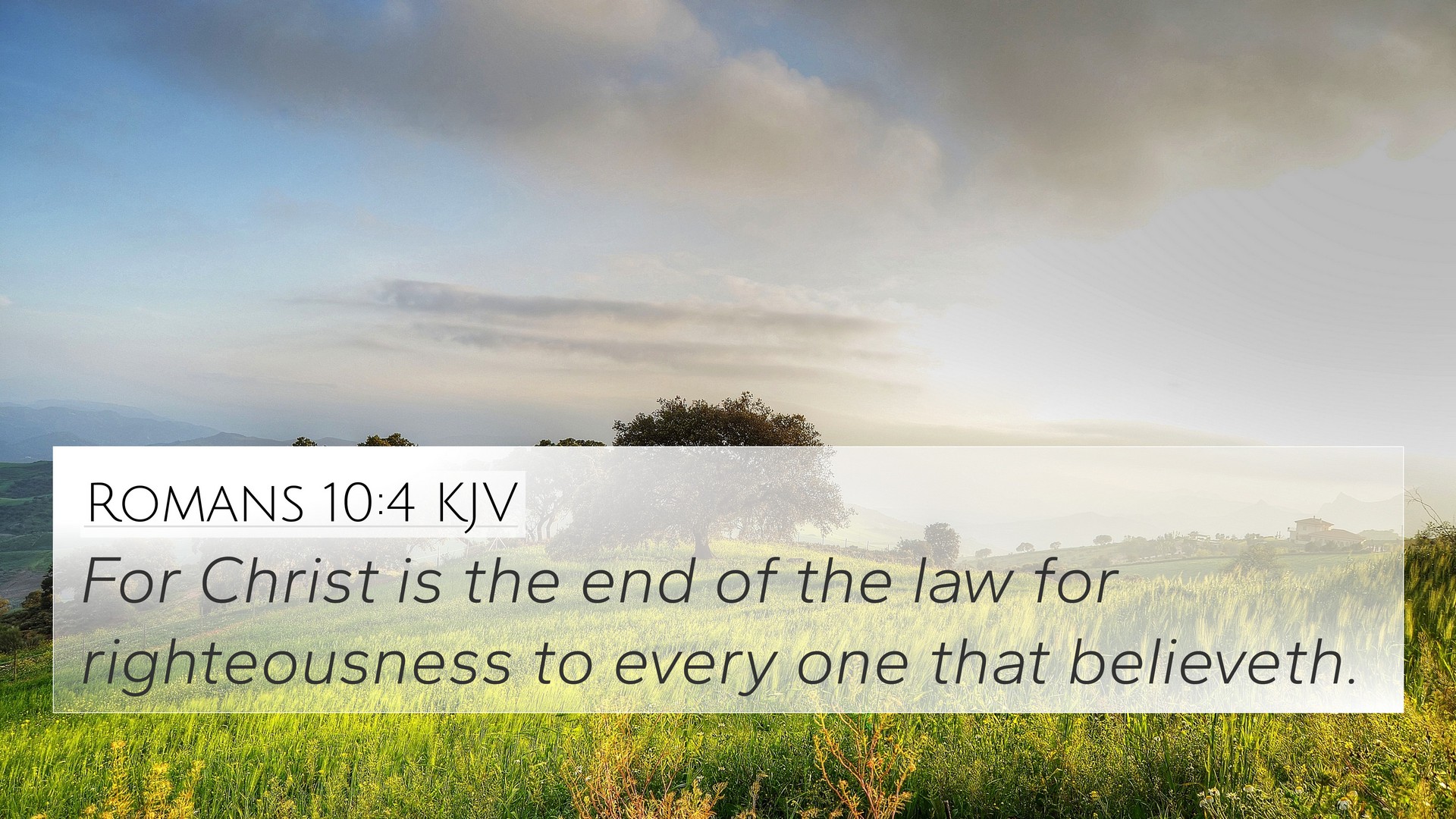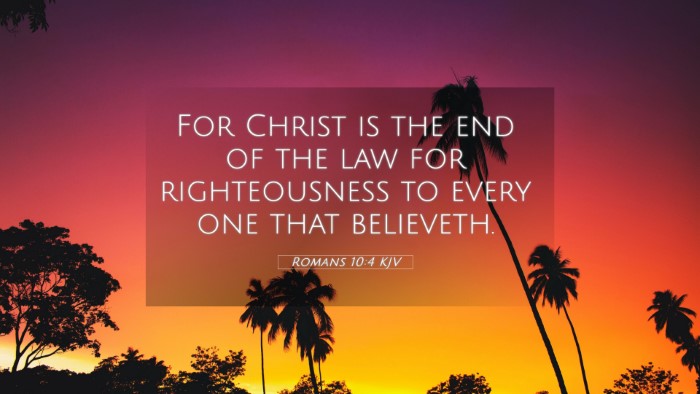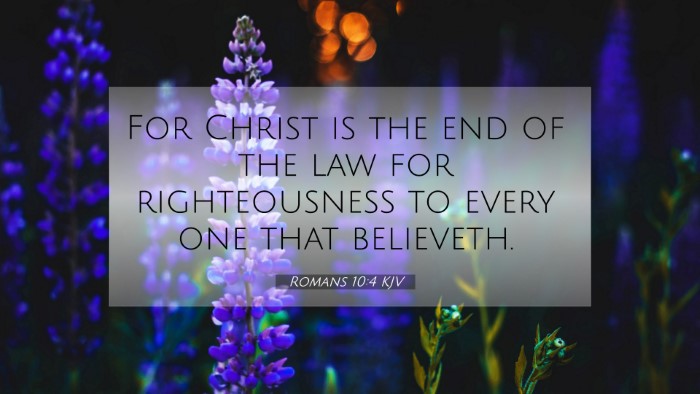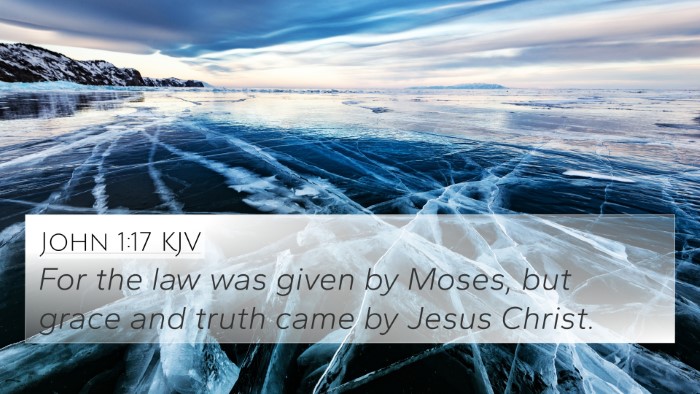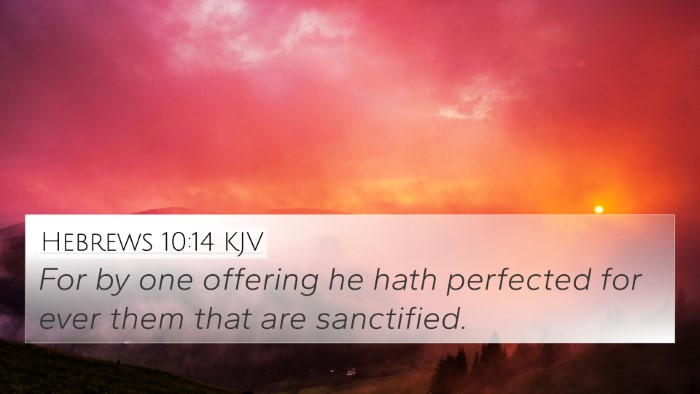Old Testament
Genesis Exodus Leviticus Numbers Deuteronomy Joshua Judges Ruth 1 Samuel 2 Samuel 1 Kings 2 Kings 1 Chronicles 2 Chronicles Ezra Nehemiah Esther Job Psalms Proverbs Ecclesiastes Song of Solomon Isaiah Jeremiah Lamentations Ezekiel Daniel Hosea Joel Amos Obadiah Jonah Micah Nahum Habakkuk Zephaniah Haggai Zechariah MalachiRomans 10:4 Similar Verses
Romans 10:4 Cross References
For Christ is the end of the law for righteousness to every one that believeth.
Uncover the Rich Themes and Topics of This Bible Verse
Listed below are the Bible themes associated with Romans 10:4. We invite you to explore each theme to gain deeper insights into the Scriptures.
Romans 10:4 Cross Reference Verses
This section features a detailed cross-reference designed to enrich your understanding of the Scriptures. Below, you will find carefully selected verses that echo the themes and teachings related to Romans 10:4 KJV. Click on any image to explore detailed analyses of related Bible verses and uncover deeper theological insights.
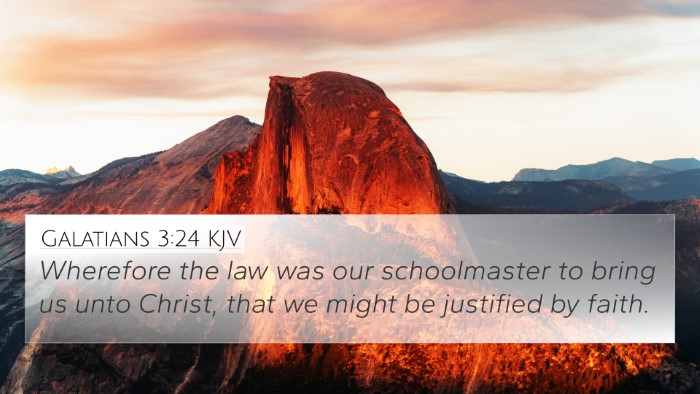
Galatians 3:24 (KJV) »
Wherefore the law was our schoolmaster to bring us unto Christ, that we might be justified by faith.
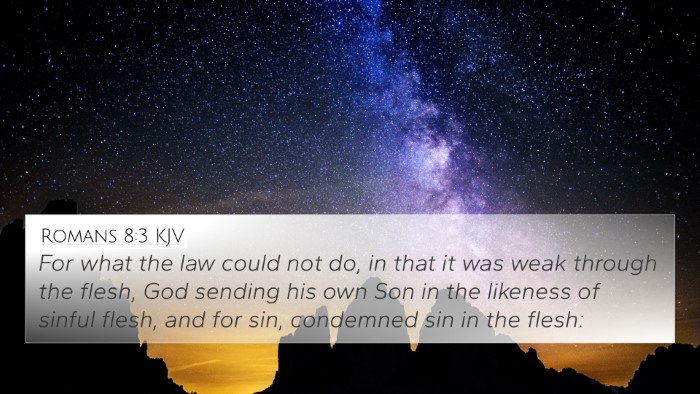
Romans 8:3 (KJV) »
For what the law could not do, in that it was weak through the flesh, God sending his own Son in the likeness of sinful flesh, and for sin, condemned sin in the flesh:

Matthew 5:17 (KJV) »
Think not that I am come to destroy the law, or the prophets: I am not come to destroy, but to fulfil.
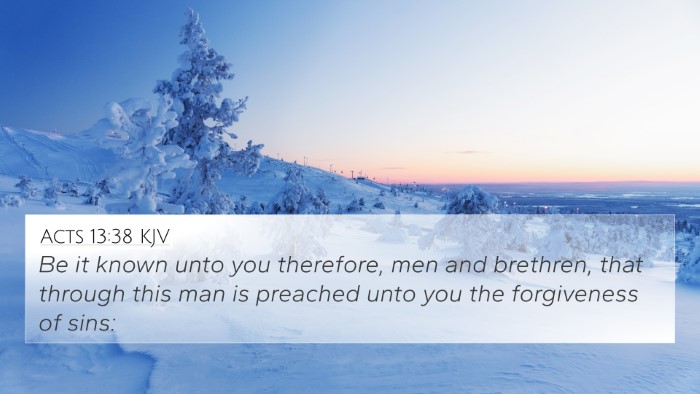
Acts 13:38 (KJV) »
Be it known unto you therefore, men and brethren, that through this man is preached unto you the forgiveness of sins:

Romans 3:25 (KJV) »
Whom God hath set forth to be a propitiation through faith in his blood, to declare his righteousness for the remission of sins that are past, through the forbearance of God;
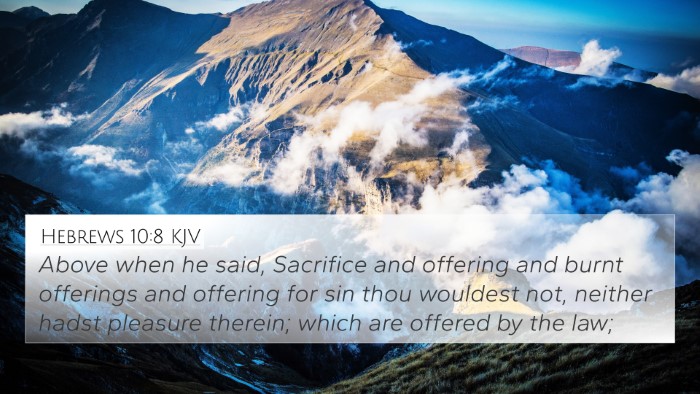
Hebrews 10:8 (KJV) »
Above when he said, Sacrifice and offering and burnt offerings and offering for sin thou wouldest not, neither hadst pleasure therein; which are offered by the law;
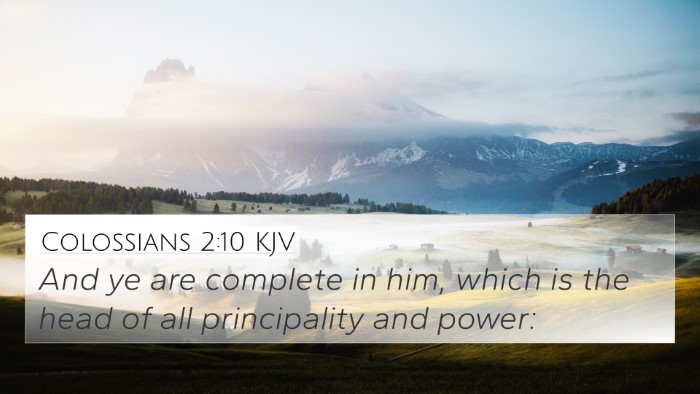
Colossians 2:10 (KJV) »
And ye are complete in him, which is the head of all principality and power:
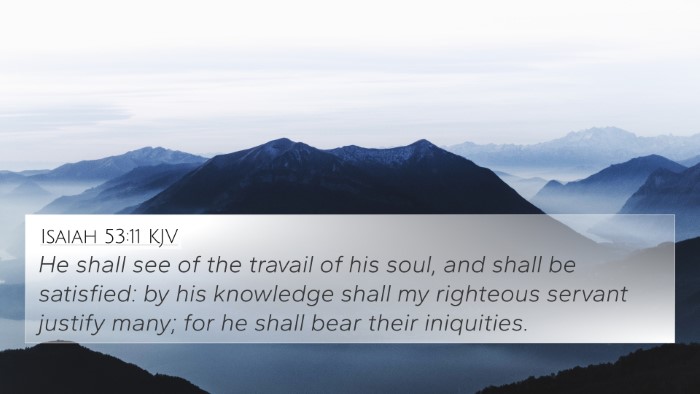
Isaiah 53:11 (KJV) »
He shall see of the travail of his soul, and shall be satisfied: by his knowledge shall my righteous servant justify many; for he shall bear their iniquities.
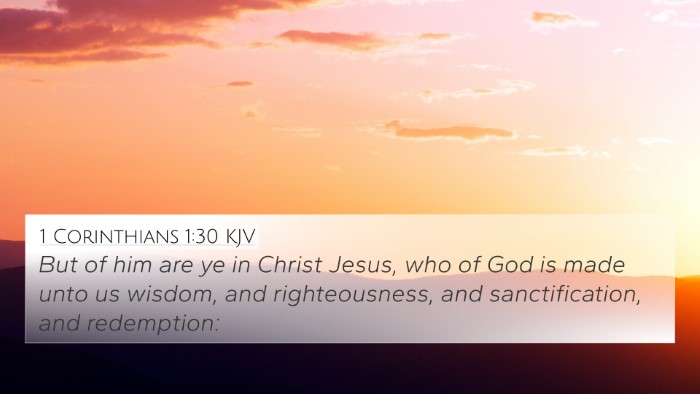
1 Corinthians 1:30 (KJV) »
But of him are ye in Christ Jesus, who of God is made unto us wisdom, and righteousness, and sanctification, and redemption:
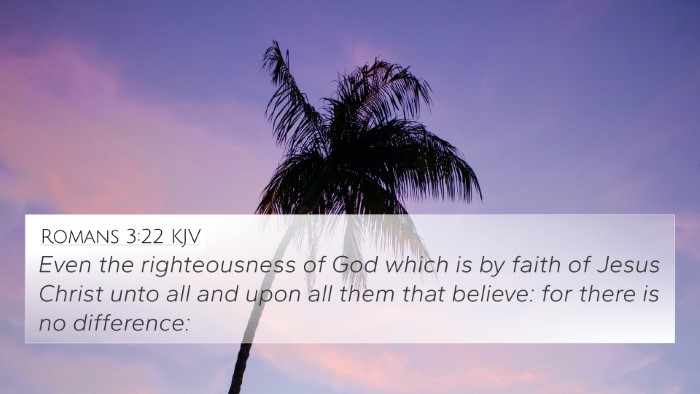
Romans 3:22 (KJV) »
Even the righteousness of God which is by faith of Jesus Christ unto all and upon all them that believe: for there is no difference:
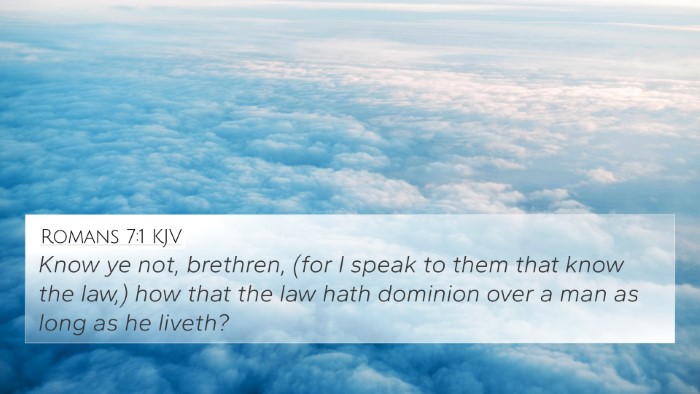
Romans 7:1 (KJV) »
Know ye not, brethren, (for I speak to them that know the law,) how that the law hath dominion over a man as long as he liveth?

Matthew 3:15 (KJV) »
And Jesus answering said unto him, Suffer it to be so now: for thus it becometh us to fulfil all righteousness. Then he suffered him.
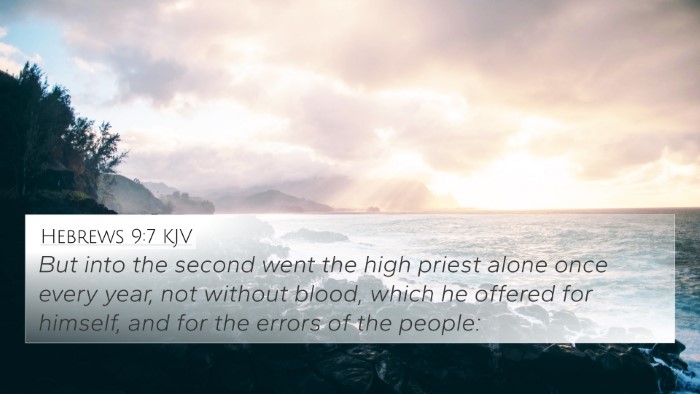
Hebrews 9:7 (KJV) »
But into the second went the high priest alone once every year, not without blood, which he offered for himself, and for the errors of the people:
Romans 10:4 Verse Analysis and Similar Verses
Understanding Romans 10:4
Verse Reference: Romans 10:4 - "For Christ is the end of the law for righteousness to everyone who believes."
Overview
This verse encapsulates the essence of Paul's argument regarding the transition from the Law to faith in Christ. It emphasizes that Christ fulfills the Law, providing righteousness to all who believe. This fulfillment signifies the conclusion of the Law's judicial authority over believers.
Insights from Public Domain Commentaries
-
Matthew Henry:
Henry explains that through Christ's coming, the Law's role as a means to achieve righteousness was completed. Instead of striving for righteousness through works prescribed by the Law, believers attain it through faith in Christ. He emphasizes that Christ is both the end of the Law's demands and the instrument through which believers are made righteous.
-
Albert Barnes:
Barnes elaborates that the term "end" signifies not just a conclusion but the ultimate purpose or aim. In Christ, the Law finds its true fulfillment. Righteousness is no longer obtained through the observance of the Law but through faith, which is accessible to all, transcending ethnic and religious barriers. This doctrine illustrates the deep unity brought by faith in Christ.
-
Adam Clarke:
Clarke discusses the implications of this verse in terms of the new covenant. He notes that while the Law was vital in guiding moral conduct, its purpose was to lead individuals to Christ. Believers are now under grace rather than Law, demonstrating the transformative power of faith that liberates them from the penalties of the Law.
Theological Significance
This verse showcases a pivotal theological shift from the works-based righteousness of the Law to faith-based righteousness through Christ. It underscores how faith in Christ is the pathway to salvation, respecting the Law's intent while realizing its limitations.
Cross References
To fully grasp the depth of Romans 10:4, consider the following cross-references that elucidate its meaning:
- Galatians 3:24-25: "Therefore the law was our tutor to bring us to Christ, that we might be justified by faith. But after faith has come, we are no longer under a tutor."
- Philippians 3:9: "And be found in him, not having my own righteousness, which is from the law, but that which is through faith in Christ, the righteousness which is from God by faith."
- Ephesians 2:15: "Abolishing in his flesh the enmity, even the law of commandments contained in ordinances; for to make in himself of twain one new man, so making peace."
- Hebrews 7:18-19: "For there is verily a disannulling of the commandment going before for the weakness and unprofitableness thereof. For the law made nothing perfect, but the bringing in of a better hope did; by the which we draw nigh unto God."
- Matthew 5:17: "Do not think that I came to destroy the Law or the Prophets. I did not come to destroy but to fulfill."
- John 1:17: "For the law was given through Moses, but grace and truth came through Jesus Christ."
- Acts 13:39: "And by him everyone who believes is justified from all things from which you could not be justified by the law of Moses."
Thematic Connections
This verse connects intricately with various themes throughout scripture, portraying the transition from Law to grace. The linkage highlights:
- Faith over Works: Emphasizing that righteousness is obtained through faith, not adherence to the Law.
- Fulfillment of Prophecy: Christ's role as the fulfillment of the Law and prophetic scripture is evident in multiple verses.
- Inclusivity of the Gospel: The accessibility of salvation to all who believe, regardless of their prior adherence to the Law.
Cross-Referencing Biblical Texts
Employing tools for Bible cross-referencing helps in understanding the connections between verses and themes. Utilizing resources like Bible concordances or cross-reference guides can enhance your study and interpretation of scripture.
Conclusion
Romans 10:4 serves as a profound reminder of the grace offered through Christ, heralding a new covenant where faith supersedes the restrictive adherence to the Law. As believers explore scripture, engaging with cross-references enriches their understanding and highlights the inter-Biblical dialogue concerning law, grace, and the righteousness that comes through faith.
